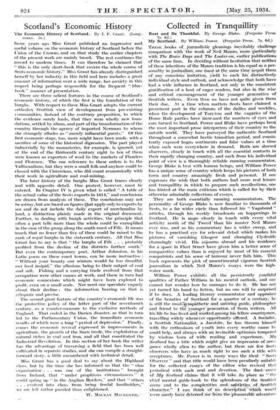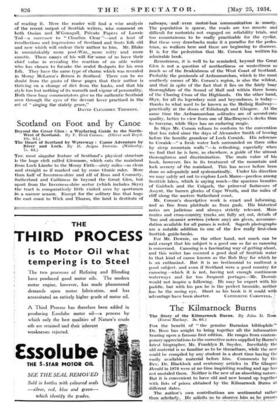Collected in Tranquillity
•
TuEsu ,books, of journalistic gleanings inevitably challenge comparison with:the work of Neil Muni°, more 'kiarliefilarly with The Braiv Days and The LoOker-on, earlier publications of the same firm. In. deciding without hesitation that neither of these inheritors of the Munro tradition is his equal as a per- sbnality in jiminallsin.one inust at the same tithe-acquit them Of any conscious imitation, 'yield to each his distinctively individual style and outlook, and acknowledge that both have had a wide influence in Scotland, not only in the consistent gratification of a host of eager readers, but also in the wise and critical encouragement of the younger generation of Scottish writers. Even then we have not quite given them their due. At a time when matters Scots have clairried a prominent part in the columns of 'the dailies and weeklies, when the development of Toryism and the vagaries of the Home Rule parties have 'Mere Used the numbers of eyes and ears turned to Scotland, Power and Blake have perhaps been the most important prose interpreters of their Country to the Outside world. They' have purveyed the authentic Scotland throughout a somewhat hectic transition period, and consis- tently exposed bogus sentiments- and false values at a time When such were everywhere in demand. Both-are shrewd Observers, closely in touch with all the essential contacts in their rapidly changing country, and each from his individual point of view is a thoroughly reliable running commentator. George Blake is best with human beings, and William Power has a unique sense of country which keeps his pictures of both town and country amazingly fresh and personal. If one expresses the wish that both authors had more real leisure and tranquillity in Which to prepare such recollections, one has hinted at the main criticism which is called for by their otherwise admirable collections of essays.
• They are ,both essentially running commentators. The personality of George Blake is now familiar to thousands of Scots, to a far wider circle than followed his " Vagabond" articles, through his weekly broadcasts on happenings in Scotland. He is mire -closely in touch with every vital activity north of the 'Tweed' than his' master Neil Munro ever was, and' so his commentary has a wider. sweep, and he has a practised eye for relevant detail Which Makes his pictures of vanishing Glasgow and changing Clydeside charmingly vivid. His sojourns abroad and his residence for a space in Fleet Street have given him a better sense of comparative values than is enjoyed -by most of his essayist compatriots and his sense of humour never fails him. • This hook represents 'the pick of unsentimental vigorous Scottish journalism in which Neil Miinro's essays were the high-
- • I water mark. .
. William Power exhibits all the persistently youthful qualities of Father William in his mental outlook, and one Cannot but wonder how he manages to do it. He has not yet turned his hand to fiction, but no one will be surprised if he does. A leading literary commentator and appraiser of the beauties of Scotland for a quarter of a century, lie is still the most d'crivthpithet le and Untiring guide, philosopher and friend to the younger generation of Scots writers. All his life he has lived arid'Workedoiniong,-his fellow countrymen, travelling widely whenever opportunity offered. A Socialist, a Scottish Nationalist, a Jacobite, be has thrown himself 'with the enthusiasm of youth into every worthy cause he could help, and always with an invincible optimism tempered 'by wisdom born of 'wide reading and experience. My Scotland has a title which might give an impression of arro- gance wholly alien to the author, but there are few Scots 'observers Who; haYc Is much right. to :nse Ouch' a title with acceptance. Mr. Power is in many ways the ideal. " Scots 'Observer " and that title would- have been peculiarly suitable for the collected essays of the editor who revived that 'periodical with such zeal and devotion. -. The dust:cover of My Scotland claims that 'it will 'take its place as "-the • 'chief- mental guide-book to - the aplendoUrs of • the -Scottish
scene • and to the complexities- and.--sphtleties -of -Scottish -
schaeaCter." I can think of no description whieh would more surely -haYe deterired me from the pleasurable adventure of reading it. Here the reader will find a wise analysis of the recent output of Scottish writers, wise comment on both Ossian and M'Gonagall, Private Papbrs of Lawrie Tod—a successor to " Claudius Clear "—and a host of 'recollections and impressions of Scotland and Scots folk old and new which will endear their author -to him. Mr. Blake is unmistakably more post-War, more witty and more ,caustic. Theic essays of his will for's6me of us have their chief value in revealing the reaction of an able writer Who has chosen to forsake the zealot` fleshpots for his own folk. They have the same type of charm which was revealed in Moray McLaren's Return to Scotland. There can be no doubt from the gusto of these pages that their author is 'thriving on a change of diet from the husks, and that his ,Style has lost nothing of its warmth and vigour of personality. Both these busy commentators give us the authentic Scotland seen through the eyes of the devout lover practised in the art of " singing the stately grace." .
DAVID CLEGIIOEN THOMSON.

















































 Previous page
Previous page